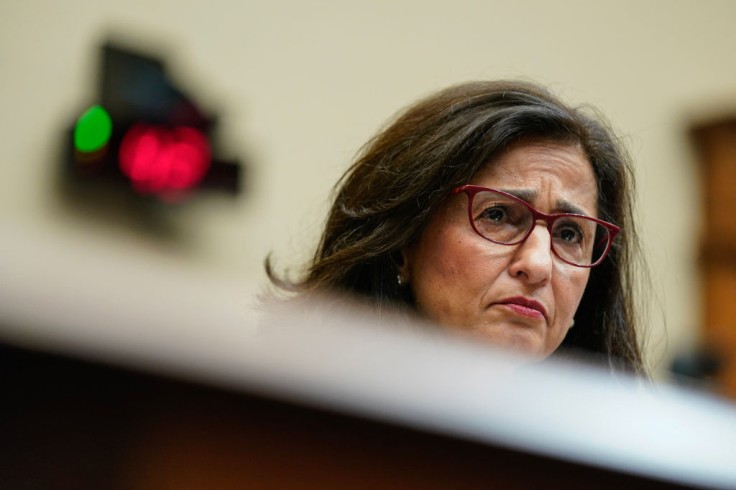House Speaker Mike Johnson Celebrates 'Long Overdue' Resignation of Columbia University President
By
The sudden resignation of Columbia University President Minouche Shafik has received mixed reactions following her controversial handling of student protests against Israel's war in Gaza.
But one thing critics agree on is that the move was "long overdue."
Speaker of the House Mike Johnson celebrated Shafik's resignation late Wednesday, saying she refused to protect Jewish students and maintain order on campus.
"I stood in President Shafik's office in April and told her to resign, and while it is long overdue, we welcome today's news. Jewish students at Columbia beginning this school year should breathe a sigh of relief," Johnson wrote on X. "... We hope that President Shafik's resignation serves as an example to university administrators across the country that tolerating or protecting antisemites is unacceptable and will have consequences."
Katherine Franke, a Columbia law professor who has expressed pro-Palestinian views, wrote on X, "President Minouche Shafik threw me under the bus when she testified before Congress, but I'm still an employee of Columbia University, she's not. Turns out that capitulating to the bullies didn't work out well for her. It never does."
Columbia Students for Justice in Palestine also applauded Shafik's departure.
"After months of chanting 'Minouche Shafik you can't hide,' she finally got the memo. To be clear, any future president who does not pay heed to the Columbia student body's overwhelming demand for divestment will end up exactly as President Shafik did," they wrote.
Shafik stepped down on Wednesday after a tenure marked by intense criticism, particularly over her response to the pro-Palestinian protests that began in April. Students set up an encampment and took over Hamilton Hall on campus, demanding that the university divest from companies they believed were supporting the war.
Over 100 students were arrested during the incident, 40 of which were charged. Most have since had those charges dropped. Columbia also canceled its graduation ceremony in response.
Several Jewish students subsequently filed lawsuits and criticized the administration for not doing enough to protect them during the protests, alleging that harassment and hate speech were allowed to go unchecked. Shafik later testified before the House Committee on Education & the Workforce, which called into question Columbia's handling of antisemitism on campus.
As Israel's 10-month conflict with Iran-backed Hamas in Gaza continues, similar demonstrations have emerged on college and university campuses across the country.
However, while many schools experienced a lull over the summer, tensions at the Ivy League institution remained high. Chief Operations Officer Cas Holloway had his Brooklyn residence vandalized by pro-Palestine protesters last week, and three university deans recently resigned after "antisemitic" text exchanges were revealed. University officials are also considering giving campus police broader authority to arrest protesters, according to the Wall Street Journal. Ahead of move-in day this fall, the university has restricted campus access to those with student IDs or prior permission in order to avoid disruptions.
In a Wednesday letter to the Columbia community, Shafik cited the tumultuous protest period as the motivation stepping down.
"I have had the honor and privilege to lead this incredible institution, and I believe that - working together - we have made progress in a number of important areas," she wrote. "However, it has also been a period of turmoil where it has been difficult to overcome divergent views across our community. This period has taken a considerable toll on my family, as it has for others in our community."
While many openly praised Shafik's resignation, others shifted the attention to what this means for Columbia's future.
"We hope that this brings to a close this period of turmoil in Columbia's history," Columbia Jewish & Israeli Students wrote on X. "We urge the Board of Trustees to appoint an interim president that will enforce campus rules, ensure student safety, and return the university to its mission of learning and teaching."
The university's chapter of Jewish Voice for Peace wrote that they will not be "placated" by Shafik's removal "as the university's repression of the pro-Palestinian student movement continues."
Meanwhile, Columbia Business School assistant professor Shai Davidai emphasized that the issue was never about the president.
"People are asking me if I'm happy. I'm not happy. I'm not unhappy. It's never been about Shafik. It's never been personal," he said in a YouTube video. "... It always has and always will be about the Jewish students, staff and faculty. I wish President Shafik all the best luck in whatever she does."
Regarding her next steps, Shafik stated that she plans to focus on combating global poverty and promoting sustainable development at the request of the United Kingdom's foreign secretary. She also mentioned her intention to return to the House of Lords to "reengage with the important legislative agenda put forth by the new UK government."
Shafik holds American and British citizenship.
On Wednesday, Columbia's Board of Trustees expressed gratitude toward Shafiks work during her time at the university.
"In this difficult year, Minouche has worked, inspired, and led tirelessly. Her wisdom, empathy, and deep commitment to our community have guided us through challenges that are both unique in scale and unique to this moment," the board said in a statement.
The board also named Columbia University Irving Medical Center CEO and Yale alumna Katrina Armstrong as the interim president.
© 2025 University Herald, All rights reserved. Do not reproduce without permission.








